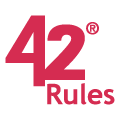I was ten years old when my mother and father told me and my siblings that they were getting divorced. We sat around the kitchen table, and I remember the sound of my legs squeaking against the yellow vinyl of the dining chair when I took my place. I thought that if I could crawl up inside that noise, then I wouldn’t be able to hear what I knew they were about to tell me, news that had been years in the making.
Those years were miserable for everyone in our home. My brother and I used to hide in the dark of my room on the far side of my bed and listen to my parents yell at each other. Eventually those arguments became so scary that my sister, my brother, and I sought refuge outside the home. My sister turned to her boyfriend while my brother and I turned to our best friends.
Christy was my next-door neighbor, and I shared her twin bed during sleepovers that happened almost every night of the week, even during the school year. Sometimes we’d play in her backyard before her parents fed me dinner, and we’d hear my own parents yelling in their bedroom about fifty feet away. Christy and I never spoke of it. In fact, she’d always tug me inside when she saw me stop to try to make out what they were saying.
Whenever I did sleep at home, I’d find my mother in tears every morning, a zombie, a vacant shell. I’d watch her wash her face in the bathroom sink and beg her to tell me what was wrong.
“Nothing,” she’d answer, always. Not once did she elaborate.
But I knew better, kids always do, and so I decided that I was going to fix things. If I made good grades, she’d be happy. If I excelled at everything I tried, she’d be happy. If I vacuumed the house in perfect lines, she’d be happy. And if my mother could just be happy, then the fighting would stop. Surely this would work.
I was the child who took my parents’ divorce the hardest. Yes, I was the youngest, and my brother and sister could process that split with more maturity than I could. But the truth is that I thought I had failed everyone. I had tried to fix it, and it broke anyway. All that furious work I had done, and the family still fell apart.
I wish my parents had had this book when they were going through all that pain. I wish my father had stopped himself from turning to me, from rocking me back and forth in his lap and asking in my ear why my mother wouldn’t come back to him.
I like to think that I learned from my parents’ mistakes, because it’s been over eight months since I separated from my children’s father, and not once have they witnessed an argument.
That’s not something to brag about, no. I mean, it should be this way by default, right? But now that I’m going through this pain myself I can forgive my parents more than just a little bit. Emotions run high and wild. When my idea of fair gets trampled on or the resentment boils and overflows, it’s hard to resist screaming at a wall IN FRONT OF EVERYONE.
I have not been perfect during this time, not even close, but before we decided to separate we made it clear to each other that the kids would always come first. Because of what I had gone through when I was ten, I had a working blueprint.
We’d honor their routine and their feelings and their confusion. We’d communicate with them often and openly, never speaking ill of each other. They’d never have to ask us repeatedly what was wrong, and neither of us would whisper one word into their ears about our own pain. They’d never have to seek refuge with someone else because being around us was too unbearable.
I feel very lucky that I have this book while I’m right in the middle of everything, because while I know many of the mistakes to avoid because of my own parents, there was a lot I was surprised to learn. I reread the sections on finances, resentment, and grief multiple times. Also, I am terrible when it comes to asking for help, and this is the most overwhelming situation I’ve ever been in. I have walked right up to the brink of an emotional breakdown once or twice in the last few months, and it’s nice to be reminded of the reasons why I can and should step away for a while.
Also, when the homework and assignments start flying like gunfire, I will wear out the pages that detail how to transfer children between houses (I’ve already dog-eared that section). This book helped me fill in many of the blanks, and I know I will reference it often in the coming months. If you have found yourself wondering how on earth to honor your children during this gut-wrenching time, or if you have no idea where to start, consider this your blueprint. Turn to these rules when you are feeling weak. Most importantly, let it help you feel a little less alone.
Heather Armstrong, a former Web designer, started publishing dooce(r) in early 2001. Heather has won numerous awards for her work on dooce.com including Best American Blog, Best Designed Blog, Best Writing for a Blog, and Weblog of the Year, and in 2008, she received a Lifetime Achievement award. In addition, Heather was named #8 in Forbes’s “The Web Celeb 25” in 2008 and 2009. Heather has been profiled in The Wall Street Journal, The New York Times, The Washington Post, USA Today, Forbes, and Businessweek, amongst others. Heather has appeared on ABC’s Nightline, NPR, PBS, ABC World News Tonight, and NBC’s The Today Show. The blog dooce is one of the most widely read personal sites on the Internet and has a passionately loyal following. She is the author of the bestselling book It Sucked and Then I Cried: How I Had a Baby, a Breakdown, and a Much Needed Margarita.

